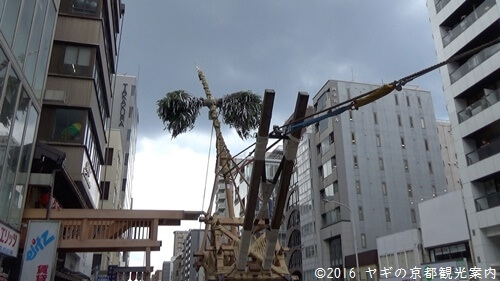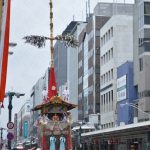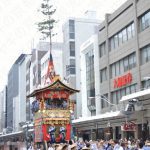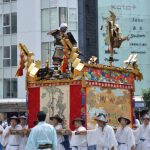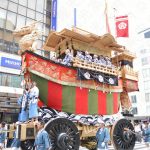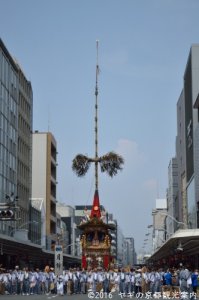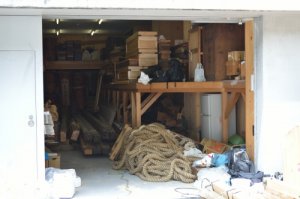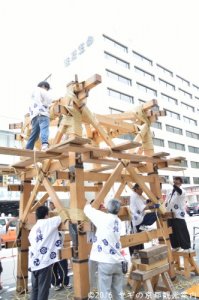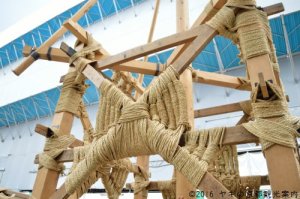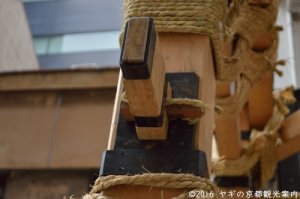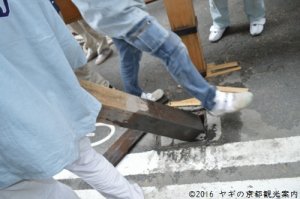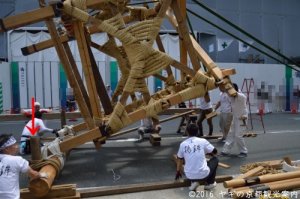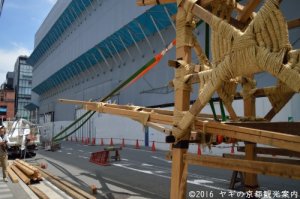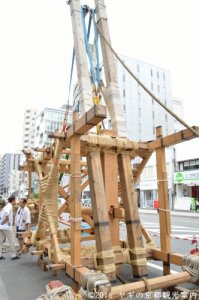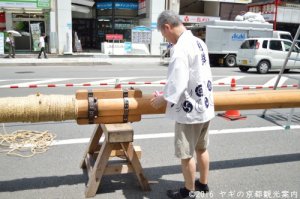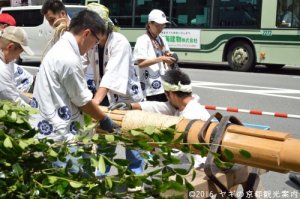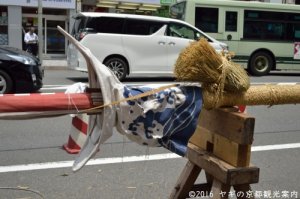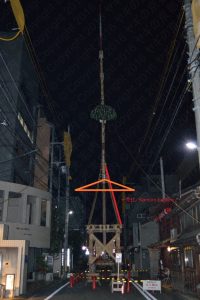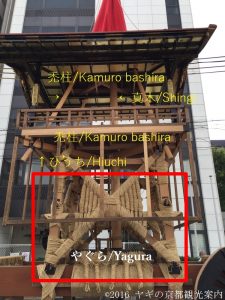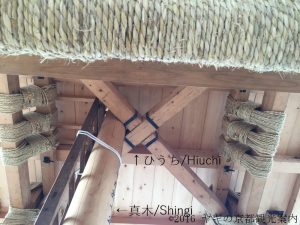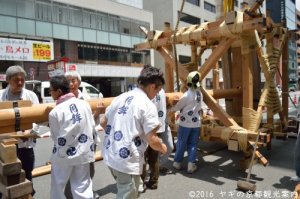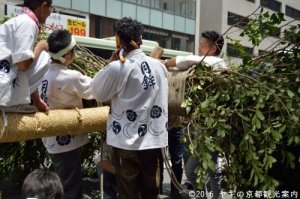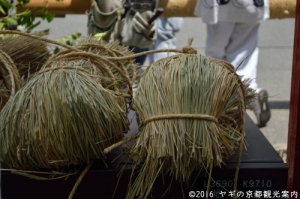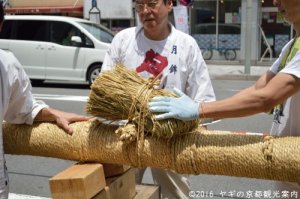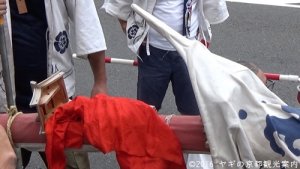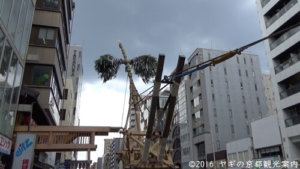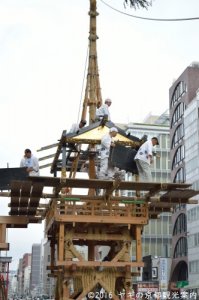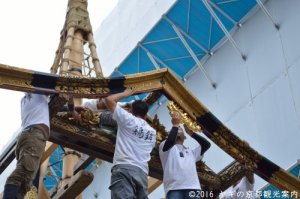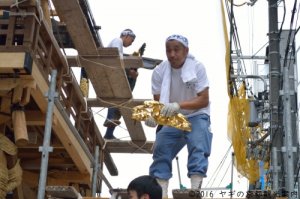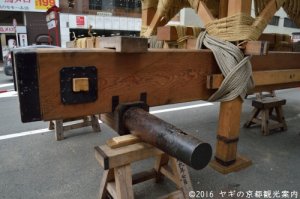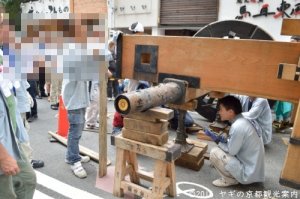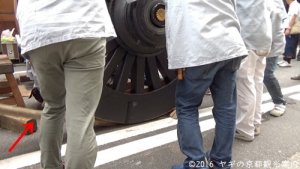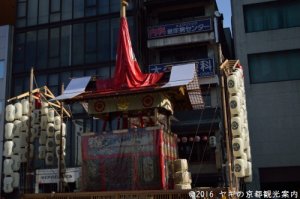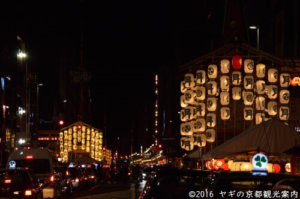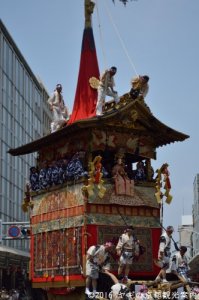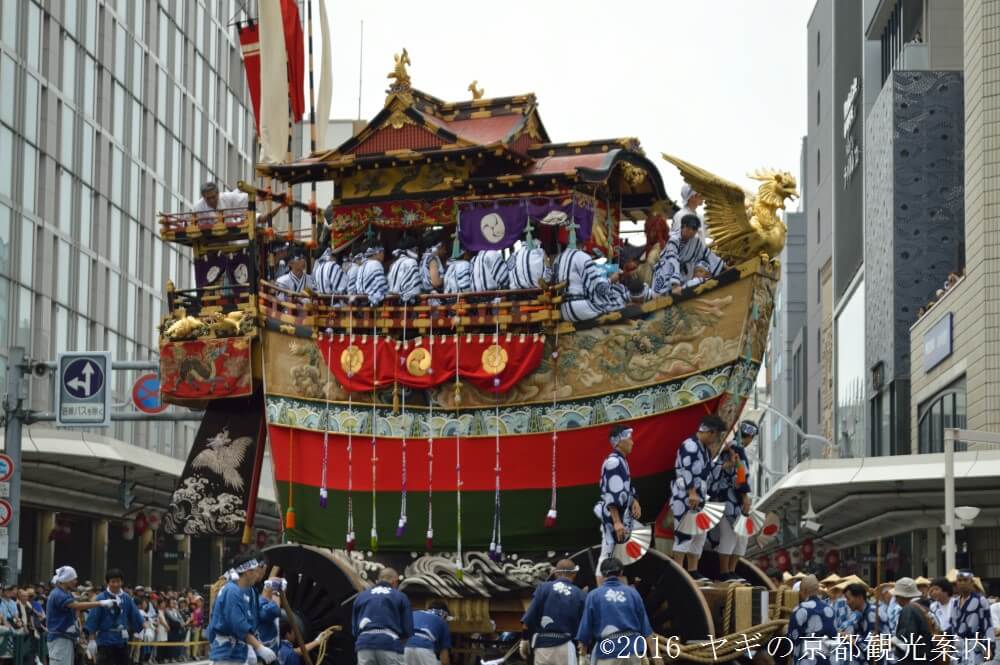Hoko tate 鉾建て(Yamahoko buidling)
In Yamahoko/ Yamaboko parade in Gion matsuri festival, we can see 4 kinds of Yamahoko float; From left to right, Hoko, Hikiyama, Kakiyama, and Yatai.
In this article, we learn the way to build Hoko in chronicle order. Hikiyama is also build in the same way because Hoko resembles Hikiyama in apperance and construction.
Where are Hokos stored?
Hoko is made of many pieces. They are stored in Kaisho, a kind of headquarters of Hoko, or warehouse in Maruyama park.
Construction of Yagura 櫓の組立
At first, Hoko-builders make a foundation of Hoko named Yagura. Every kind of Yamahokos has this structure.
Yagura is a framework of Hoko. Hoko-builders put pillars together with rope and wedge. The way to tighten rope is called Nawa garami. This technique works as a kind of shock-absorber and prevent Hoko from falling down.
Put Shingi on Hoko 真木たて
Lay Yagura down 櫓を倒す
Shingi is a rod on a roof of Hoko. How can we put on it?
Take a look at the photo above. There are holes on the road. Usually, they have rids.
Hoko-builders put short pillars on them and fix them with wedge.
The red allow indicates the pillar. The pillar was tightened to the log the man holds. The log is also tightened to Yagura and works as a pivot.
Long rods are installed to lay down Yagura. Hoko-builders hook ropes on them and winch up the ropes.
Now Yagura lays down.
Then, Hoko-builders put wood rods together with ropes to make Shingi. The Singi in the photo is that of Tsukihoko’s and almost 85 feet long.
Shingi has a Tenno-dai. The upper part of Shigi is a bamboo rod and Tennno-dai is installed to the bamboo rod. When Hoko moves, the rod swings away and the movement gives Hoko refined taste.
On tenno-dai, there is a small figurine called Tenno ningyo. Tenno ningyo is a Goshintai. Goshintai is an object to which Deity descend.
Why does Shingi need Deity? The reason is that Shingi plays a role to gather Ekishins. The Deity on Shingi helps to do it. After Yamaboko parade, the Deities of Yasaka shrine come to the center of the Kyoto city on portable shrines, and calm down the Ekishins.
In the ancient times, people believed that the phantom of politically ousted person became Ekishin and caused malady. On the other hand, they thought if they could calm Ekishin down, they would save them from malady with their huge power.
That’s the aime of Gion matsuri festival: To gather Ekishins and calm them down.
The construction of Hoko 鉾の構造
Now, let us learn about the construction of Hoko. The photo shows the framework of Hoko. The orange line indicates a roof and red line does a supporting rod called Kamuro-bashira.
Kamuro-bashira is connected to crossed rod called Hiuchi. Hiuchi is under the floor and fixed not to it but Yagura. When Hoko moves, Hiuchi moves to the opposite direction to Hoko itself and prevent Hoko falling down.
Put Shingi into Yagura 真木を挿す
After Shigi is completed, Hoko-builders put it to the bottom of Yagura.
Ornament Shigi with Sakaki and Shaguma 榊やしゃぐまをつける
Shingi is decorated with Sakaki, a sacred tree.
Shigi is also ornamented with Shaguma.
Let Deity rule 天王人形をお乗せする
In the end, Hoko builders put Goshintai on Tenno-dai. The photo is a Goshintai of Tsukihoko named Tsukiyomi no mikoto/ Tsukuyomi no mikoto. He is a brother of Susanoo no mikoto, the Deity enshrined in Yasaka shrine.
Goshintai is so sacred that we cannot look it down. So, it is wrapped in a cloth. The cloth has a string. A man holds it and the cloth is gone when Shingi stands.
Set up Shigi 真木を立てる
Winch up the rope again to set up Shingi.
Check the video!
Install roof and floor to Yagura 舞台と屋根をつける
After setting up Shingi, Hoko builders put roof and floor to Yagura and decorate them with beautiful ornaments.
Put wheels to Yagura 車輪をつける
Hoko-builders put huge pieces of wood named Ishimochi. They put wheel shaft under them.
To install wheel, they jack up Hoko.
Hoko-builders hold the wheel and put it into the shaft with stick ( the red allow indicats).
Ornament Hoko with tapestry , etc. 懸装品をつける
After the installing of wheel, Hoko is ornamented huge tapestry works, and so on.
In night time, paper lanterns are lit.
Finally, on the day of Yamahoko parade, important object like Goshintai (most of all Hoko has Goshintai other than Tenno ningyo). After the parade, Hoko is taken to pieces.
We can see fully ornamented Hoko couples of hours a year.
About Gion matsuri festival 祇園祭について
Check the article!


